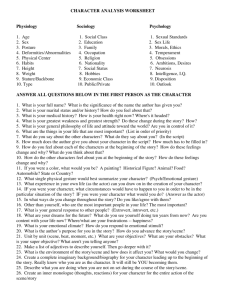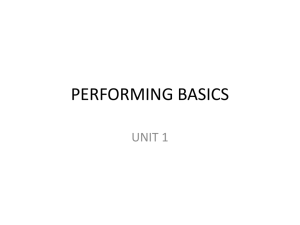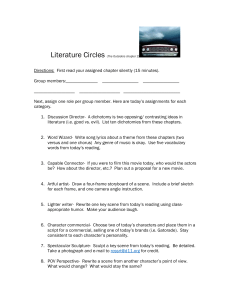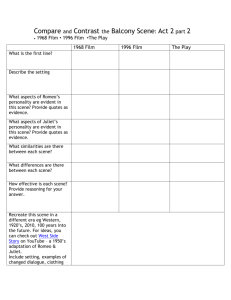Jargon
advertisement
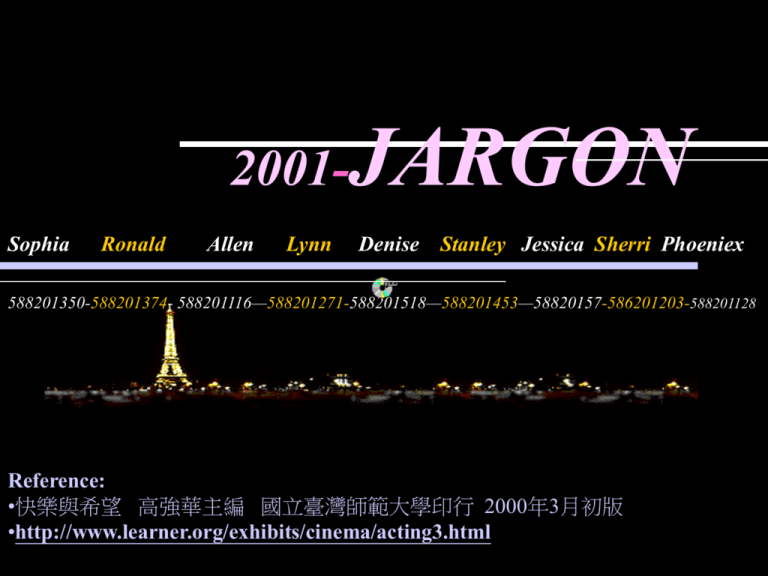
JARGON 2001Sophia Ronald Allen Lynn Denise Stanley Jessica Sherri Phoeniex 588201350-588201374- 588201116—588201271-588201518—588201453—58820157-586201203-588201128 Reference: •快樂與希望 高強華主編 國立臺灣師範大學印行 2000年3月初版 •http://www.learner.org/exhibits/cinema/acting3.html What is the Jargon? Every science, profession and occupation has its own set of words, some of which are considered to be “slang” and others “ technical,” depending on the status of the people using these “in” words. Such words are sometimes called jargon or argot. Quiet on the Set: Film Jargon What is a “take”? If you're asked to “cheat”, what are you being asked to do? As an actor on a film set, you'll need to know the following words and phrases. actor's call cheating action cut hit your mark Your call to the set. You will be called at least an hour before the assistant director thinks you will be needed—be sure to show up at least a half hour before that. This will help you become accustomed to the set, the props, and the atmosphere. Never be late; the cost of a crew waiting for you is enormous. When an actor takes on a physical position that would not be natural in real life, such as looking at something other than the person or object on which she is supposedly focused. This is often necessary to get the right effect or perspective on film. The word the director uses when he wants the actors to begin performing. The director's instruction to stop a scene. The director is the only person on the set allowed to "cut," or stop, a scene. If the assistant director, sound mixer, or camera operator needs to stop the scene for any reason, they call out "break it." The ability to find your predetermined location in the scene without looking at the marks that have been placed on the floor. long shot A camera angle used to stress the environment or setting; the camera is at a distance from the subject of the shot. that's a wrap A phrase that means, "We're done. Shooting is over for today." close-up Positioning the camera close to an actor's face (or any object that is significant in the scene) so that the person or object fills the frame. pickup The director uses this term to indicate that he or she wants to redo a small part of the scene. For example, if a scene is going well until someone forgets a line, the director might want to pick up the scene near that point to avoid resorting the entire scene. Film Jargon 799 8! Social Varieties – Teenager’s Language 865!! Teenager’s Language (Taiwan) Explanation 載卡多 肥胖者 a fat person 隔壁老王 別人/不是我 洗耳朵 聽音樂 It’s other’s fault not mine. to listen to music L.K.K. 老酷酷 (Taiwanese) old person S.P.P. 聳幣幣 (Taiwanese) vulgar; out of fashion BMW 長舌婦 Big Mouth Woman ? 7998! Teenager’s Language (Taiwan) Explanation 7998 Let’s take a walk! 77543 Guess who I am! 865 Don’t bother me. 7450 07860 I’m terribly mad (quite furious). Did you have your meal? 918 Cheer Up! Word Denotation Connotation Situation 老油條 Chinese food for breakfast A sleeky fellow Negative 哈姆雷特 Famous work (莎士比亞) Not understand meaning;Too advanced! You are great! To exaggerate! 補(台語) nutrition Someone have good look! Positive cool The weather is cool! Someone’s topic is boring! Ironic 超棒 General Language Ironic Ironic Word Denotation Connotation Situation Follow the traffic rules To be law-abiding Some people have specific look! Negative amiability A kind person, easy to get along with other people. 隨便說說,就一言 不合。 Negative 芭樂(吹氣球) food boasting Negative quality A person has an elegant feeling. Childishness and nervousness Negative Group Members Sophia Ronald Allen Lynn Denise Phoenix Stanley Jessica Sherri 黃鈴慧 蕭黃介 曾子龍 施慧苓 王巧亭 彭詩惠 楊峻維 謝金蓉 白 蘋 -THE END- Designed by Ronald
